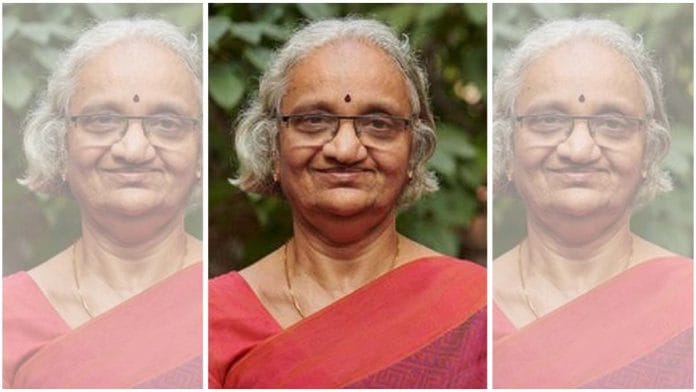New Delhi: The narrative about mental health in Indian media and films, which have stoked stigma and demonised disorders, needs to change, according to psychiatrist Thara Rangaswamy.
The renowned community mental health researcher, who is best known for her advocacy for schizophrenia to be added to the list of disabilities in central legislation in 2016, was among the 29 women achievers who were conferred the Nari Shakti Puraskar by President Ram Nath Kovind on International Women’s Day (8 March).
In an interview with ThePrint, Rangaswamy spoke about the state of mental health awareness in India, the stigmas around it, its portrayal in the media, and the way forward.
Rural areas in north India are in dire need of mental health awareness, services and access to professionals, she said.
“While urban areas are witnessing increased access to mental health services, rural areas are still lagging behind. Though small organisations and government initiatives are functioning in rural south India, the northern part of the country still does not have awareness, professionals or access to services,” she said.
According to the National Mental Health Survey of 2016, around 150 million Indians are in need of active psychiatric interventions.
Rangaswamy, co-founder and vice-chairperson of Schizophrenia Research Foundation in Chennai, believes that a large-scale government intervention is required to spread awareness regarding schizophrenia and other mental health disorders.
She had lobbied hard for the inclusion of mental disability in the Rights of Persons with Disabilities Act, 2016. She was also responsible for the development of a tool called IDEAS, which is officially used to measure disability in schizophrenia.
“It needs to be understood that schizophrenia does not occur due to black magic but it is a disorder of the human brain that causes structural, biochemical damage. The bottom line in this disorder is the functioning of the patient. It needs to be found how well they function with medical and psycho-social support,” she said.
While the policy now gives some form of support for those with over 40 per cent of severity of schizophrenia, the family members of these patients need to understand what will help them deal with it better, she added.
According to Rangaswamy, the incidence of schizophrenia in India is between 0.5 and 1 per cent. However, for a rural patient, it takes about 8-10 years to be diagnosed and get treatment.
Also read: Singapore ‘most fatigued’, Mexico & Brazil don’t get much sleep either, UK bedmaker’s study finds
Shift in attitude towards mental health
The psychiatrist, who is on the advisory committee to the director general of the World Health Organisation (WHO), also believes that the pandemic has accelerated the shift in attitude towards mental health issues in India.
“Even policy-makers and politicians have seen that mental health has become a glaring issue after the pandemic. So many studies indicate that there has been an increase in incidence of issues like anxiety, depression,” she said.
“In urban areas, it is refreshing to see young people coming forward to seek treatment and talk about their mental health issues. This is normalising treatment,” she said.
She also noted how mental health disorders have been demonised and further stigmatised by media in India.
Pushing for a need for a change in the narrative in media and films, she said, “It is very important that the media checks on the way mental health issues are portrayed. Criminals with mental health issues are hyped up and written off as ‘psychos’, and words like these make it to the headlines. It further stigmatises mental health issues.”
She added: “Even in films, a trope has been created about how people with mental health problems are ‘retarded’ or cannot function in social settings. With increased awareness, it is time for a change where films and media show the real challenges and success of people with mental health issues.”
New honour and distinguished career
Speaking about the Nari Shakti Puraskar, the 69-year-old said: “It not only shows the increased awareness regarding mental health but also encourages young women to take up psychology as a field of study.”
Rangaswamy was one of the three women from Tamil Nadu to be given the honour for her work on spreading awareness regarding mental health in the country.
Rangaswamy was previously awarded the Honorary Fellowship of the Royal College of Psychiatrists, UK in 2014, and also the President’s Gold Medal of the same Royal College in 2010.
Also read: India’s mental health conversation is opening up. Better access to treatment is next






